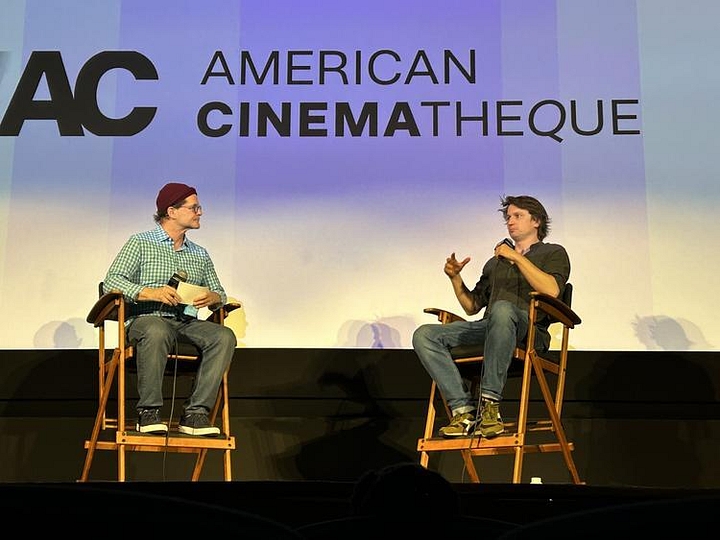LA
Ukraine, In The Rearview
by | Jan 11, 2024 10:17 am
Post a Comment | E-mail the Author

Maciek Hamela and Matthew Carey in conversation.
IN THE REARVIEW
Los Feliz Theater
Los Angeles
Jan. 7, 2024
On a windy Sunday at the Los Feliz Theater, Maciek Hamela pops out from behind the curtain before the screening of his new documentary, In the Rearview. Unassuming in faded jeans and a gray T‑shirt, he carries none of the deferent nervousness or cool ego affected by other industry event spotlightees. Instead, the Polish director opens with a simple declaration: “When we started this film, we thought the war would be over by the time it was done.”
In February 2022, when Russia initially invaded Ukraine, Hamela purchased a van to ferry evacuees across the border; he began offering rides on Facebook, and soon was helping to organize a small network of volunteers to transport the growing pool of displaced people. The idea to film his passengers didn’t occur to him, he says, until after the operation was established.
Very little of this backstory can be gleaned from the director’s sophomore, Oscar short-listed documentary. In the Rearview consists largely of a locked-off camera, pointing from Hamela’s front seat back toward his passengers. There is no voiceover; there are no history lessons, no maps,hardly even a timestamp. The passing scenery outside the van windows gives us no indication of the changing seasons, and we are left to orient ourselves solely through the city names spoken by passengers and the temperatures they’re dressed for. There are none of the more frenetic indicators of war, either — no explosions, no ducking, and no running for cover. The camera insists that we focus solely on the faces in the back of the cab.
And we listen. In North Face jackets, sweatshirts emblazoned with motivational slogans, and sci-fi movie shirts, passengers argue over phone chargers, share earphones, and punch locations into Google Maps. They sniff over abandoned livestock, murmur to their pets, bicker with their siblings. Young women talk about businesses they want to start. Children speak matter-of-factly about death.
At the Q and A that follows the screening, Hamela underlines his mission statement. “There’s always war footage now,” he says. “Everyone’s got cell phones, so we don’t feel the danger anymore.” He goes on: “We didn’t want to destroy the fragility of these stories that are very subtle. You have to hear [the refugees] out.”
Hamela is, in his own words, just a regular guy from Poland. He had never done frontline work before. As he answers our questions, his voice grows heavy with emotion. He reiterates, again and again, his argument that the broader story of the war is secondary to the personal stories of his passengers. “When you stick to the principal ideas, it doesn’t really matter that it’s Ukraine,” he says. “It could be any war. It could be Gaza, Sudan.”
I realize that I have walked away from this screening with a new tool to process the footage that we find ourselves inundated with as smartphones become ever more ubiquitous in war zones. I am grateful to Hamela for his message, for what he has labored to show us in his documentary: that in the age of sensationalism, constant chatter, and desensitization to global violence, the power of bearing witness is still paramount.